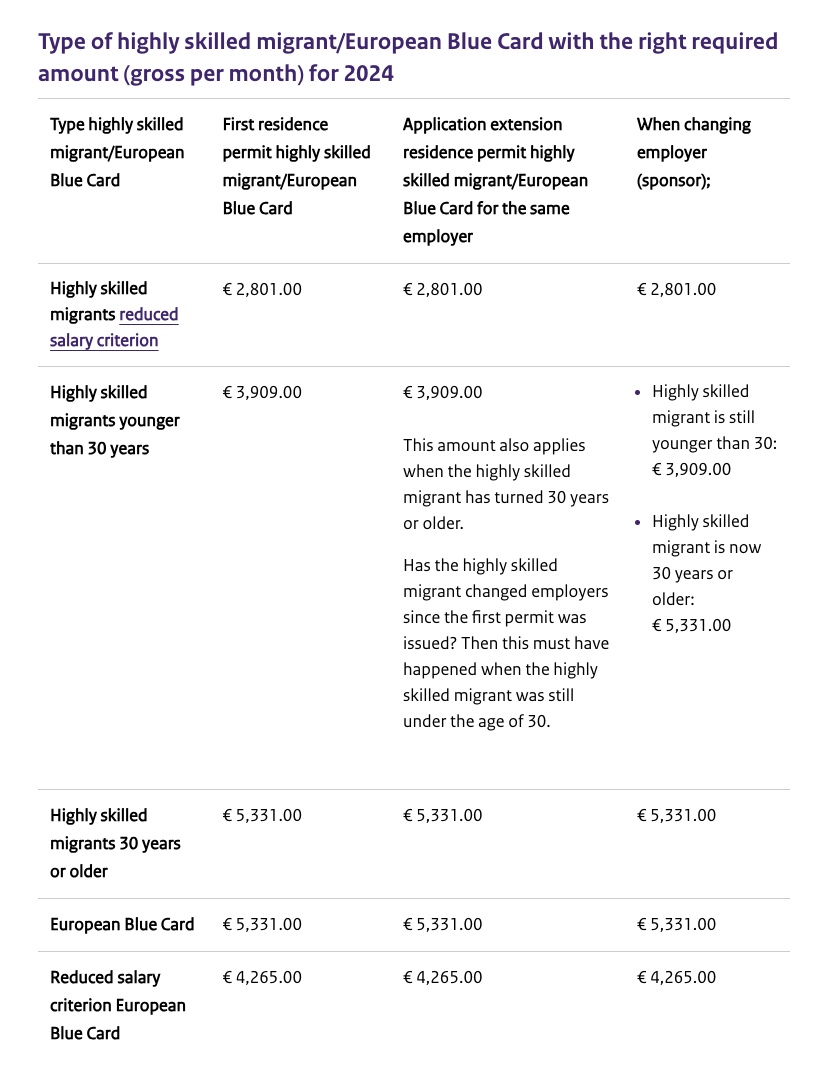What is working in the Netherlands like? Is it currently easy to find a job with a visa there? The Netherlands is renowned for its high standard of living, job opportunities, rich culture, and social security. There’s no better time for moving to the Netherlands and start your expat journey. Are you ready to build an international career in one of the most prosperous countries in Europe?
But before you pack your bags, there are some important things to keep in mind. Our career guide will help you navigate all the essential steps for getting a work visa in the Netherlands. We’ll cover everything related to moving to and working in the Netherlands, from initial costs to visa types, and whether you’ll need career coaching.👇🏻

Can you find a job in the Netherlands with English?
If you have been thinking about getting a work visa in the Netherlands, you may know that you don’t need to know Dutch to move to the Netherlands. Locals, especially in Amsterdam, speak English fluently. While cultural shock is inevitable, knowing a language commonly taught from an early age will ease the adaptation process.
Most companies in the Netherlands operate in the international market, so English is often sufficient for securing employment.
How does the Dutch work culture differ from other countries?
The Dutch corporate culture highly values work-life balance. For instance, with your manager’s approval, you can finish your workday earlier. On sunny days, you might take a half-day off to spend time with your family. Or you could negotiate a shorter workweek, working four days a week, nine hours each day — this is quite common here.
Dutch work culture is known for its emphasis on work-life balance and direct communication. Employees often work flexible hours, and there is a strong focus on efficiency during working hours to ensure ample personal time. Hierarchies are generally flat, and everyone’s opinion is valued, making it essential to be prepared for open, direct feedback.
However, it’s essential not to idealise the Netherlands too much. The Dutch mentality might not resonate with everyone; they are very direct. If you’re used to a different cultural approach, it might take some time to adjust.
What is the average cost of living in the Netherlands?
The cost of living in the Netherlands is relatively high, especially in cities like Amsterdam. Expect to spend around €2,200 per month on average, including rent, groceries, transportation, and leisure. Housing is one of the largest expenses, with rents varying significantly depending on the location and type of accommodation
Find out if we can help you find job in the Netherlands 🇳🇱
Book a free 15 min call where we will discuss your case
and walk you through our career coaching services
What is the average salary in the Netherlands?
Housing in the Netherlands isn’t cheap, but salaries are quite high. According to the Netherlands Bureau for Economic Policy Analysis, the average salary in the Netherlands in 2024 is €2,200 per month after taxes, but it is higher in Amsterdam.
The Dutch are very open and straightforward, both in personal life and at work. They might come up to you and say, “This report isn’t good; it needs redoing.” But this doesn’t mean they are being confrontational; they’ll likely offer help right after. This openness can be disconcerting at first, but you’ll come to appreciate communication without hidden meanings.
Career coach @ EP Advisory | Career in the Netherlands | Book a free call with Andrei
Now that we’ve covered work, what about leisure? Those who love traveling and outdoor activities will enjoy it here. You can easily spend weekends in Germany or Belgium, or explore the local streets and go for a bike ride. Despite the developed transport network, bicycles remain the main mode of transport in cities.

The Netherlands offers every opportunity for a quality life, leisure, and career. read below about how to get a work visa in the Netherlands.
How can I get a work visa in the Netherlands?
To obtain a work visa in the Netherlands, expats must have a valid reason for moving. The most common reasons for obtaining a residence permit are employment, education, and business. After five years of residence, you can apply for permanent residency.
Applications for residence permits in the Netherlands are handled by the local Immigration and Naturalisation Service (IND). While the IND processes the long-term residence permit, expats are usually first issued an MVV visa for entry into the country, valid for three months. Let’s explore the types of work visas available in the Netherlands.
What are the main types of visas available for moving to the Netherlands in 2024?
The Netherlands offers several types of visas depending on your purpose for moving:
- Single Permit (GVVA) Visa: Combines a residence permit and work permit for non-EU citizens planning to work for more than three months.
- Highly Skilled Migrant (Kennismigrant) Visa: Designed for highly skilled professionals in in-demand fields like IT, engineering, and marketing.
- EU Blue Card: A residence and work permit for highly qualified professionals from non-EU countries.
- Entrepreneur Permit Visa: For those planning to launch an innovative business in the Netherlands.
- Student Visa: For international students enrolled in Dutch universities.
Single Permit (GVVA) Visa
To work in the Netherlands, non-EU or Swiss citizens must obtain Single Permit (GVVA) – a document that combines a residence permit and a work permit. It is required if you plan to work in the country for more than three months.
Your future employer must first apply for an employment permit (the first part of the Single Permit), provided all the Dutch government requirements are met:
- You have a contract with a local employer for at least 12 months.
- Your future income meets the government’s set level. Check income requirements for 2024 here.
- Your employer could not find a suitable employee among EU or Swiss citizens. The vacancy was open for at least five weeks (or three months for some sectors), but no suitable candidates were found.
Once the employment permit is obtained, you can apply for a visa. If your employer is unfamiliar with the work permit procedures, you can study the entire process and handle part of it yourself.
🔥 🇳🇱 2024 requirements for GVVA visa in the Netherlands:
- Employment Contract: You need a contract with a Dutch employer for at least 12 months.
- Income Level: Your salary must meet the Dutch government’s minimum wage criteria. For 2024, the salary requirement is €2,297.80 per month for those aged 21 and older (full-time work) source: Dutch Government Minimum Wage Data, 2024.
- Employer Requirement: Your employer must demonstrate that they could not find a suitable candidate within the EU or Switzerland, meaning the position was advertised for a minimum of five weeks (or three months in specific sectors).
Detailed Information and Application Process for GVVA Visa
Who Doesn’t Need to Obtain a GVVA?
- Holders of the Blue Card
- Graduates of Dutch universities eligible for the Orientation Year program
- Entrepreneurs with a startup visa
- Family members of residence permit holders in the Netherlands with the right to work
There are also simplified rules for students who combine studies with 16 hours of work per week, trainees, artists, religious figures, and refugees.
Highly Skilled Migrant (Kennismigrant) Visa
This is a national programme for highly skilled professionals and one of the most popular work visas in the Netherlands. The Highly Skilled Migrant visa is issued for five years and is common among IT professionals – programmers, analysts, architects, engineers – as well as other in-demand professions, from marketing to recruitment.
🔥 🇳🇱 2024 requirements for work visa (Highly Skilled Migrant visa) in the Netherlands:
- A corresponding salary level, which depends on the employee’s age and is indexed annually. As of 2024, it is €5,008 per month for those over 30 years old and €3,672 per month for those under 30. If you graduated from a university course within the last three years, you might qualify for a lower threshold of €2,543 per month (similar to the Orientation Year visa requirements).
- The company you plan to work for must have special accreditation to invite workers from abroad. The list of such employers is available on the IND website. Your employer may also apply for this license specifically for you, and we have had cases where this has happened!

Blue Card
The Blue Card is a residence and work permit for highly qualified professionals from non-EU countries to work in the EU. Denmark and Ireland are not included in the Blue Card scheme.
The Blue Card is considered a permit for highly skilled professionals, essentially those who have completed a higher education course lasting at least three years. Additionally, the salary requirements for the EU Blue Card are higher than for the Highly Skilled Migrant visa—€5,867 per month before taxes for most professions.
Income Requirements for Blue Card and Highly Skilled Migrant Visas (2024)
The Blue Card does not offer significant advantages compared to the Highly Skilled Migrant system. The only exception is if you plan to move to another EU country soon. In that case, the time you spend in the Netherlands on a Blue Card will count toward the total years of work and residence on this visa in another country, allowing you to obtain permanent residency without additional delays.
To obtain a Blue Card, you need:
- An employment contract for at least one year.
- A set level of salary. In the Netherlands, this is €70,404 per year before taxes, or €58,080 for certain professions.
- A higher education diploma. If your education was not obtained in the Netherlands, it must be validated through the Nuffic system.
- Qualification verification, if necessary (for doctors, lawyers, etc.).
🔥 🇳🇱 2024 requirements for Blue Card in the Netherlands:
- Salary Requirement: The minimum salary requirement for the Blue Card in the Netherlands is €5,867 per month before taxes.
- Contract Duration: You must have an employment contract for at least one year.
- Higher Education Diploma: Your degree must be equivalent to at least three years of higher education. If your degree was not obtained in the Netherlands, it needs to be validated through the Dutch system, such as Nuffic.

Income requirements for Blue Card and Highly skilled migrants visas: https://ind.nl/en/required-amounts-income-requirements#application-for-a-residence-permit-to-work-in-paid-employment
Orientation year for graduates visa
You can obtain a student visa to study in the Netherlands. After graduating from a Dutch university, students have three years to apply for the Orientation Year for Highly Educated Persons programme. This program allows graduates to seek employment in the Netherlands for a year..
Entrepreneur permit visa
The startup visa is for those planning to launch their own innovative business. An immigrant working on their project must do so with a mentor. If the project is successful, the foreigner can apply for a residence permit after a year.
🔥 🇳🇱 2024 visa requirements:
- Collaboration with a Facilitator: You must work with an approved facilitator who supports startups.
- Innovative Business Idea: Your business idea must be innovative, with a well-structured business plan.
- Financial Requirements: There is no specific income requirement, but you must demonstrate sufficient financial means to support yourself during your stay.
Essential start-up personnel visa
This pilot programme will last only four years, from 1 June 2021 to 1 June 2025. Growing innovative startups can attract employees from around the world, welcoming both beginners and experienced professionals. The visa is issued for four years.
Self-employed visa
This program is for self-employed entrepreneurs in the Netherlands. It is issued for two years with the possibility of extension. To obtain the visa, you need to prepare a business plan that includes your professional experience, the nature of your business, and its value to the country’s economy. The plan is assessed using a point system, with a maximum of 100 points for each section. To qualify for the residence permit, you need at least 30 points for each part of the plan.
Research permit
As the name suggests, this visa is for researchers and scientists. It is issued for up to five years and does not require as high a salary as, for example, the EU Blue Card.
Intra-corporate transferee
This applies when you are transferred to a Dutch office within the same company. As with the Highly Skilled Migrant visa, your employer must sponsor the visa.
How do I move to the Netherlands for studies?
Moving for studies is one of the best options for immigration to the Netherlands . It offers the opportunity to obtain a prestigious diploma recognised worldwide and start an international career. After graduation, you have a year to find a job in the Netherlands.
Dutch universities offer a wide range of English-taught programmes. For example, the Rotterdam School of Management (RSM), one of Europe’s top business schools, offers various undergraduate and postgraduate programmes, including MBA, Executive Education, and PhD courses.
On average, tuition for international students ranges from €6,000 to €20,000 per year, with scholarships available for the most talented students.
One of the most well-known scholarship programmes is the Orange Tulip Scholarship. Fourteen universities across the country offer over 40 grants for various specialisations, from economics to medicine. Other popular scholarships are listed on the Study in Holland website, where you can also find general information about studying in the Netherlands.
Highly talented students can also apply for government grants in the Netherlands, such as:
- NL Scholarship (formerly known as Holland Scholarship): Available to students who meet university requirements and do not already hold a degree from a Dutch institution. The scholarship offers a one-time payment of €5,337.
- Orange Knowledge Programme (OKP): This scholarship is a Dutch global development programme offered in 54 countries. The programme is funded by the Dutch Ministry of Foreign Affairs.
Dutch universities also offer both merit-based and need-based scholarships:
- Merit-based scholarship from the University of Amsterdam: To apply, you must be enrolled in an English-taught program at the university. The scholarship is valid for one year but may be renewed based on the student’s performance.
- Scholarships from Delft University of Technology: These are specialized scholarships for master’s students in specific fields.
- Need-based scholarship from Utrecht University: Usually covers part of the expenses and is available to both bachelor’s and master’s students. You must provide information about your family’s income to apply.
- Scholarships at the University of Twente: Mainly available for master’s and doctoral students. To apply, you must be enrolled in a program. Awards range from €3,202 to €23,484.

Moving to the Netherlands for work: How to find a job and get an offer?
Many believe that employment opportunities abroad have drastically reduced since February 2022. However, the experiences of our clients who received offers as recently as March 2024 prove otherwise. Let’s break down what you need to know.
If you already have work experience and your profession is in demand, you can confidently apply for a Highly Skilled Migrant visa or Blue Card. Common professions include not only IT specialists but also marketers, logistics professionals, energy experts, creative professionals, and more.
It’s more challenging for specialists whose work is tied to a specific language, such as editors or copywriters. To increase your chances of employment, consider developing skills in a related field, such as targeted advertising or trying your hand at SMM and PR.
Another immigration option available to Russian-speaking professionals from many countries is relocation within a company. Many international companies have offices in the Netherlands. The most obvious examples are Big 4 and Big 3 consulting firms, Heineken, and Booking.com. Relocation will be easier for middle and senior-level professionals with in-demand skills, such as developers or UX designers.
Career coach @ EP Advisory | Career in the Netherlands | Book a free call with Andrei
How do I get a work visa for the Netherlands?
Job search websites/Job boards
The most popular options to find a job with a work visa in the Netherlands include:
Local portals:
Major aggregators: Randstad and Stepstone.
For IT/web jobs: Ictergezocht.nl, Careers.stackoverflow.com, Webdesign.nl.
Job listings for expats: Undutchables.nl, Togetherabroad.nl.
Recruitment agencies
Here are three recruitment agencies in the Netherlands where you can send your CV:
Social media: LinkedIn and Facebook
Job hunting through social media can be more effective than through career websites.
Follow the pages of companies and communities that interest you. Stay updated on news and announcements, and share your own experiences. Engage in case studies and interact with colleagues—one professional comment might catch a recruiter’s attention and lead to further communication.
Try finding acquaintances and former colleagues who could recommend you for a position at your desired company. In Europe, job placements often rely heavily on networking and recommendations.
Reaching out to recruiters
Don’t hesitate to contact recruiters or even company leaders where you’d like to work, even if there are no current vacancies. They might return to you with an offer when a suitable position opens.
You can find a recruiter’s contact details on the company’s website or use services like Hunter.io by entering the company’s domain.
A brief message of 5-7 sentences with an attached CV will suffice. Keep it concise: quickly explain how you can benefit the company.
Networking offline
Attend thematic events, network, and make new contacts. You can find such meetings in specific Telegram channels or on websites like Meetup.

Improving your CV to find a job with a work visa in the Netherlands
Here are some tips on how to create an effective CV that won’t be overlooked by recruiters and help you find a job with a work visa in the Netherlands:
- Your CV should have a minimalist design, with consistent fonts and text divided into sections. While it may seem obvious, many applicants underestimate the importance of harmonious formatting and go overboard with creativity. The simpler, the better: avoid bright colors, graphic elements like stars, underlines, etc.
- Measure twice, cut once: always check your CV for grammatical errors. You can use tools like Grammarly for this.
- It’s important to fill out your CV so that the recruiter understands who you are and what you’re about within the first 10 seconds. Review the key requirements for the positions you’re applying for and create a list of keywords to include in your description. For example, if the job posting for a marketing role mentions “performance,” ensure that word is in your CV. The more such matches, the easier it will be for the recruiter to see that you’re a perfect fit for the job.
- Include not only your responsibilities but also your achievements using the structure “skill – activity – result.” For example: “Created a landing page with a 50% conversion rate, generating an additional €100,000 per annum in revenue for the company.” Pro tip: If you are looking for a job in the EU, convert all the currencies in your CV into Euro (€). It will make it easier for recruiters to read.
- Make sure to save your CV with your name in PDF format, so the formatting doesn’t change when opened on another device. For example: John_Doe.pdf.
🔥🔥🔥 Find out more: Effective resume in English (based on our experience of editing 30,000+ CVs)
Applying for jobs with work visa in the Netherlands
The most important thing when applying is to slightly tailor your CV to each job ad. To do this, you should:
- Highlight the exact requirements mentioned in the job description.
- Reflect relevant achievements from your previous position.
- Write a cover letter or at least a brief message demonstrating your interest in the job and your value.
Remember: searching for a job is a full-time job
Consistency is key in job searching. Set aside specific times for it: for example, half an hour each weekday and several hours on weekends.
Don’t send out hundreds of identical applications: focus on quality over quantity. We also recommend keeping a spreadsheet of all your applications so that when a recruiter calls, you don’t find yourself thinking, “Wait, did I apply there?”
Find out if we can help you find job in the Netherlands 🇳🇱
Book a free 15 min call where we will discuss your case
and walk you through our career coaching services
Be prepared for rejections
Rejections are inevitable, but they’re not a reason to get discouraged. On average, only 10% of companies respond with an interview invitation out of 300 applications. Be patient and keep searching.
If you keep getting rejected, analyse your applications and learn from your mistakes. You can also ask recruiters for feedback. Send a short email like: “Good afternoon. Your feedback would be greatly appreciated in helping me grow professionally. Could we have a quick five-minute call?”
What are the income requirements for the Highly Skilled Migrant visa in 2024 in the Netherlands?
As of 2024, the income requirements for the Highly Skilled Migrant visa in the Netherlands are:
- €5,008 per month for those over 30 years old.
- €3,672 per month for those under 30 years old.
- €2,543 per month if you graduated within the last three years from a Dutch university or equivalent programme.
How do I apply for a residence permit in the Netherlands?
To apply for a residence permit:
- Ensure you meet the criteria for the visa type you’re applying for (e.g., work contract, income requirements).
- Submit your application to the Immigration and Naturalisation Service (IND), either online or at a Dutch embassy.
- If you’re applying for a long-stay visa (MVV), this must be done at a Dutch embassy in your home country.
Can I move to the Netherlands without a job offer?
Yes, but under specific circumstances:
- You can move as a student on a student visa.
- Entrepreneurs can apply for a startup visa.
- If you’re married to or in a registered partnership with a Dutch citizen, you can apply for a family reunification visa.
What documents do I need to prepare before moving to the Netherlands?
Before moving to the Netherlands, prepare the following documents:
- A valid passport (at least three months beyond your planned stay).
- Birth certificate (translated and apostilled if necessary).
- Employment contract or university enrolment letter.
- Proof of financial means (e.g., bank statements).
- Health insurance documentation.
- Any required visas or permits.
EP Advisory helps with your career in the Netherlands
Dreaming of moving to the Netherlands and building an international career there? Andrei Logvinenko, a career coach for the Netherlands, can help you start this journey. Andrei has years of experience in recruitment and up-to-date knowledge of the European job market. Find out more about our career coaching services and start working towards your career goal today!





